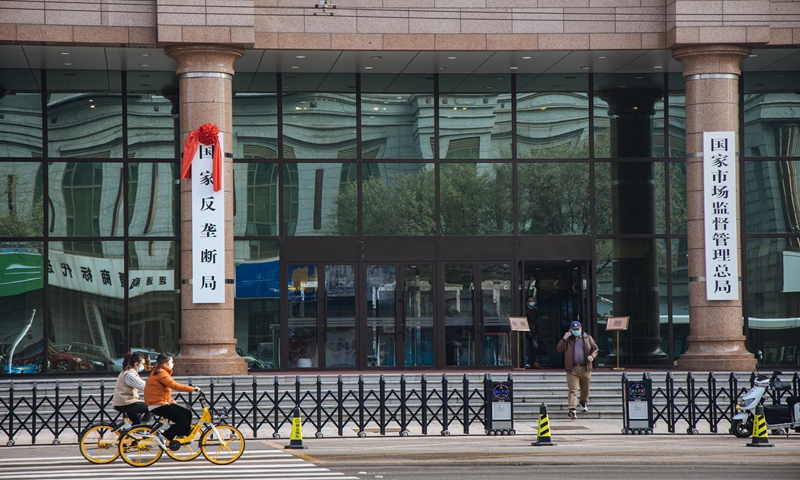
China's anti-monopoly bureau officially launches on November 18, 2021. It's located in the same building as the country's top market regulator, the State Administration of Market Regulation, in Beijing. Photo: Li Hao/GT
The Political Bureau of the Communist Party of China Central Committee held a meeting on Friday, pointing out that the platform economy must develop in a healthy way. Experts noted that the positive narrative indicates the end of the latest round of strict rectification and suggested policies encouraging the growth of the sector so as to drive the Chinese economy.
"Rectifications for the platform economy will be completed, regular supervision will be initiated and specific measures to support its standardized and sound growth will be unveiled," officials agreed at the meeting.
The change from "strengthen" rectifications to "complete" indicates the end of this round of special rectifications of the sector, while the meeting stressing the rollout of "specific measures" also shows that rules for regular supervision may come out soon, Pan Helin, joint director of the Research Center for Digital Economics and Financial Innovation affiliated with Zhejiang University's International Business School, told the Global Times.
The fine-tune in supervision of the platform economy is widely expected, as this round of crackdown on internet giants' monolithic behaviors has basically achieved the desired effect, and the sector is also important for anti-pandemic efforts and for the recovery of the real economy, especially in stabilizing jobs, said Li Yi, a senior research fellow at the Internet Research Center of the Shanghai Academy of Social Sciences.
"As a crucial part of the private economy, internet companies have created a large number of jobs, and bourgeoning entrepreneurship not only produces new jobs but adds fortunes to the society," Li told the Global Times.
Following the Politburo meeting, Chinese internet firms led a broad rally in Chinese stock market on Friday. The Hang Seng Tech Index soared 10 percent. Alibaba trading in Hong Kong surged by 16 percent to HK$102.1 ($13) as of closing, Meituan went up 16 percent to HK$172 and Tencent 11.07 percent to HK$377.4.
While US stocks sunk on Friday, Alibaba trading in the US market still jumped by 6.8 percent to $97.68.
Domestic internet giants including Alibaba, Tencent and JD.com didn't immediately reply on Saturday.
"After two-year special rectifications, the platform economy in China has been reborn with a brand-new look," Pan said, noting that illegal and unfair practices that hinder the development of other industries and harm personal privacy, among others, have been removed.
Since the end of 2020, China has mounted an anti-monopoly crackdown campaign targeting the internet sector, as the sector's rampant expansion in recent years has created disorder in the market and heightened risks.
In October 2021, Chinese food delivery platform Meituan was fined 3.44 billion yuan ($520 million), or 3 percent of its 2020 domestic revenue by the State Administration for Market Regulation (SAMR), for monopolistic practices.
In April 2021, the SAMR imposed a fine of 18.23 billion yuan on domestic e-commerce mammoth Alibaba for its violation of anti-monopoly laws. The regulator also summoned 34 internet firms, including Alibaba, Tencent, Baidu and JD.com, urging them to launch internal investigations and make rectification on issues involving "choosing one from two."
Pan said that the platform economy is of crucial importance to the Chinese economy amid the pandemic and complex global situations, and its supporting role should be given full play. "While regulating the sector, the authorities should promote the development of platform economy to solve the problem of resource allocation inefficiency and create new economic growth points and more jobs by encouraging new platform-related business models," he said.
On March 16, a meeting held by the financial stability and development committee under China's State Council also urged relevant departments to improve the established plans to govern the platform economy. They should steadily advance and complete the rectification work on large platform companies as soon as possible through standard, transparent, and predictable regulation, according to the meeting.
Both "red lights" and "green lights" should promote the steady and healthy development of the platform economy and improve its international competitiveness, officials said during the meeting.
Meanwhile, the country has been accelerating the amendment of the anti-trust law to strengthen regulations of the platform economy. Gan Lin, deputy minister of the SAMR said at a press conference on April 26 that the anti-trust law amendments had been submitted to the National People's Congress and are expected to be passed by the end of 2022.




